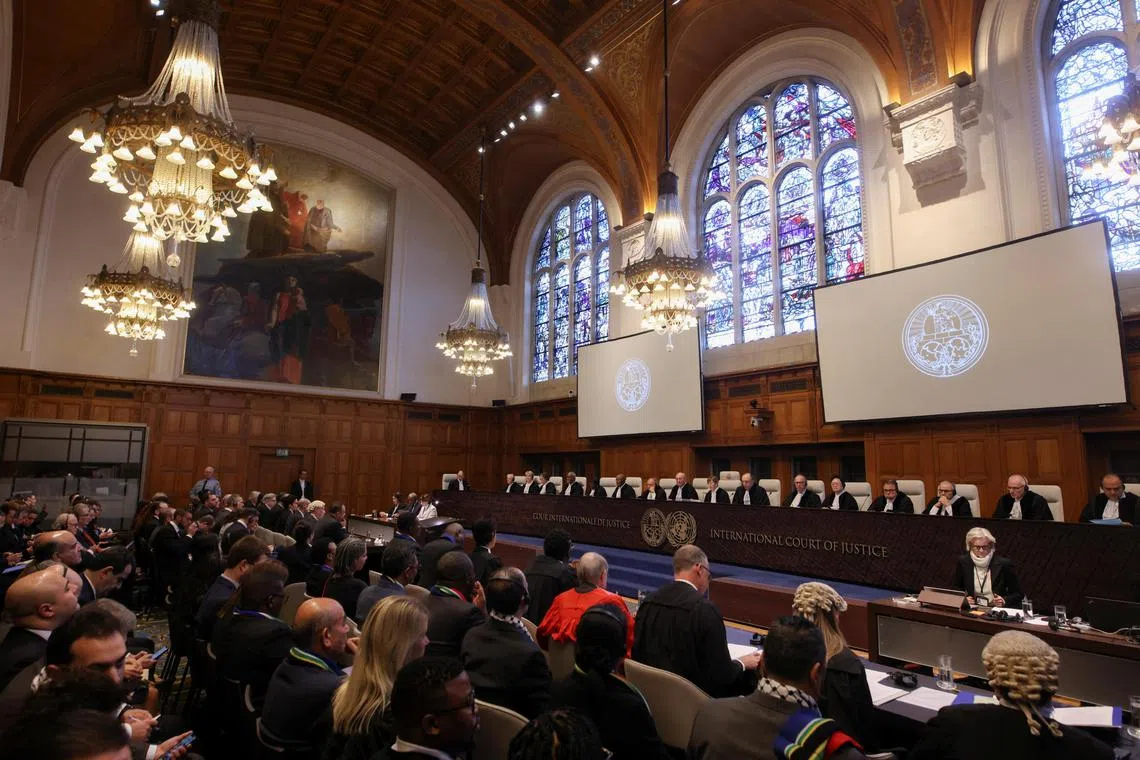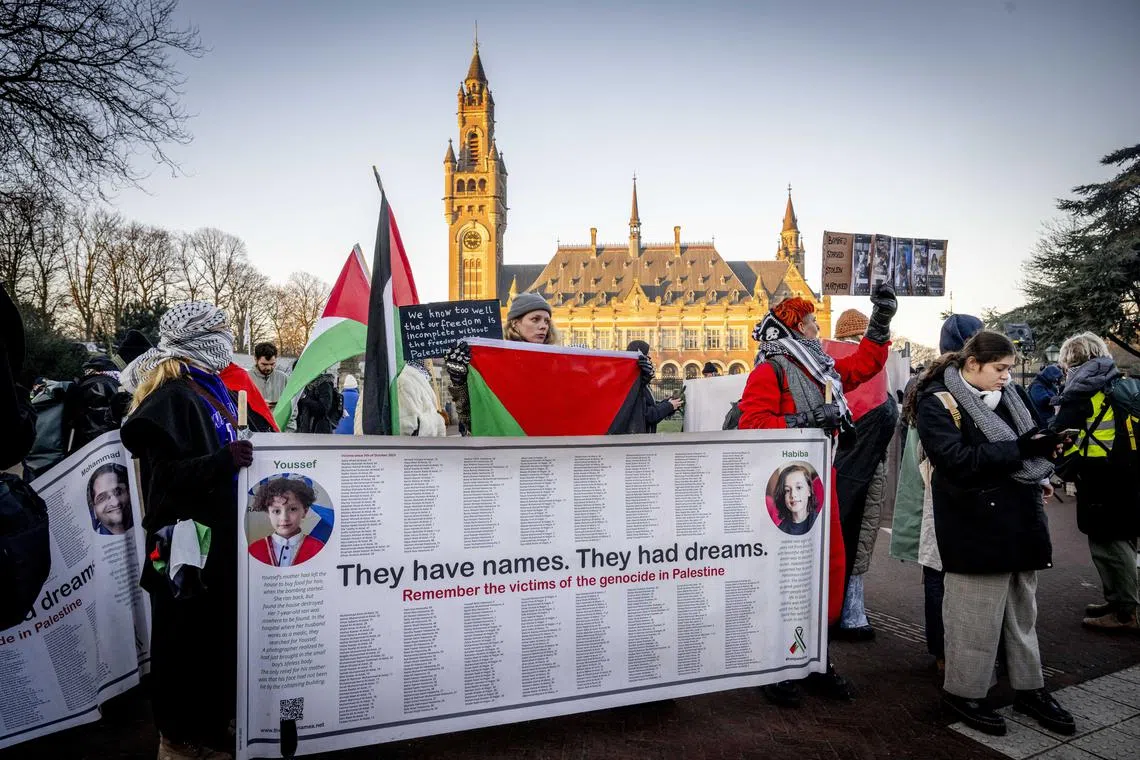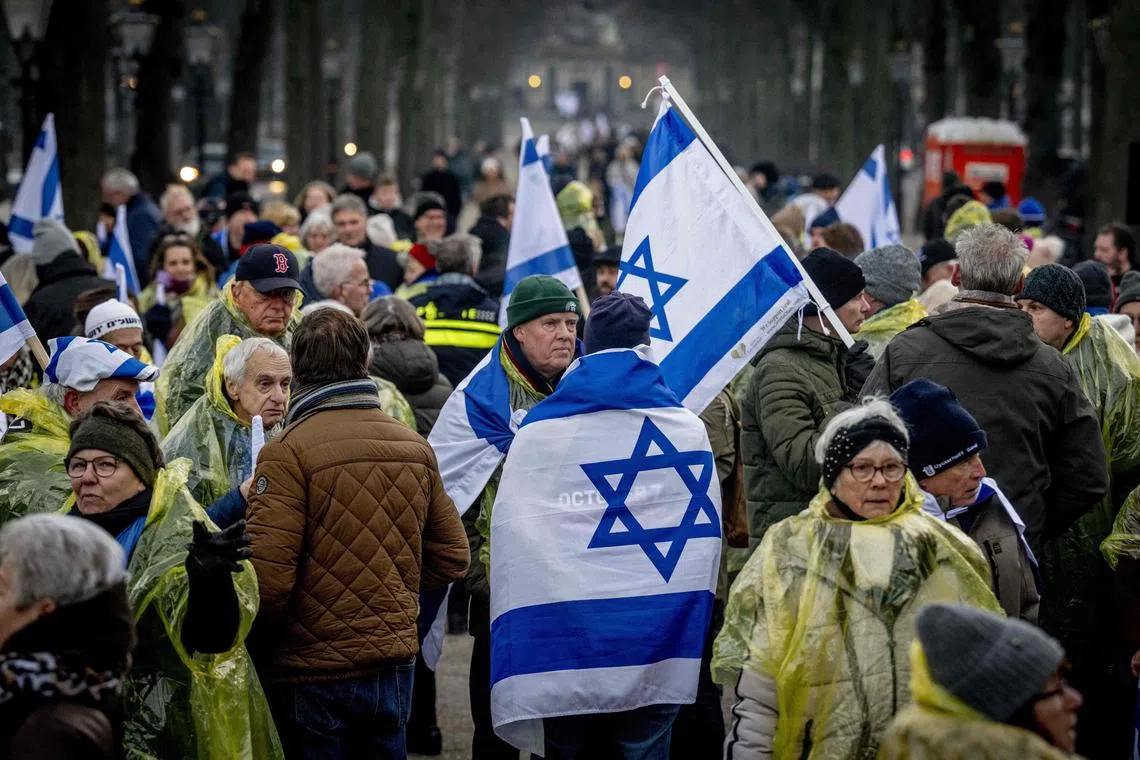At World Court, South Africa accuses Israel of genocidal acts in Gaza
Sign up now: Get ST's newsletters delivered to your inbox

The International Court of Justice will hear South Africa’s arguments on Jan 11 and Israel’s response to the allegations on Jan 12.
PHOTO: REUTERS
THE HAGUE – South Africa accused Israel on Jan 11 of subjecting Palestinians to genocidal acts
On the first of two days of hearings at the International Court of Justice (ICJ), South Africa said Israel’s aerial and ground offensive aimed to bring about “the destruction of the population” of the Palestinian enclave.
“The intent to destroy Gaza has been nurtured at the highest level of state,” Mr Tembeka Ngcukaitobi, advocate of the High Court of South Africa, told the court.
He said Israel’s political and military leaders, including Prime Minister Benjamin Netanyahu, were among “the genocidal inciters”.
“That is evident from the way in which this military attack is being conducted,” he said.
Israel has rejected the accusations of genocide as baseless and accused Pretoria of playing “advocate of the devil” for Hamas, the Palestinian Islamist militant group Israel is waging war against in Gaza.
Israel launched all-out war after a cross-border rampage on Oct 7
South Africa points to Israel’s sustained bombing campaign, which has killed over 23,000 people in the Gaza Strip, according to the health authorities in the Hamas-run territory.
The legal team at the ICJ, known also as the World Court, also pointed to comments by Israeli Defence Minister Yoav Gallant, who said early in the war that Israel would impose a total blockade as part of a battle against “human animals”.
“The evidence of genocidal intent is not only chilling, it is also overwhelming and incontrovertible,” Mr Ngcukaitobi said.
The 1948 Genocide Convention, enacted in the wake of the mass murder of Jews in the Nazi Holocaust, defines genocide as “acts committed with intent to destroy, in whole or in part, a national, ethnic, racial or religious group”.
“Every day, there is mounting, irreparable loss of life, property, dignity, and humanity for the Palestinian people,” said Ms Adila Hassim, an advocate of South Africa’s high court. “Nothing will stop the suffering, except an order from this court.”
Post-apartheid South Africa has long defended the Palestinian cause, a relationship forged when the African National Congress’ struggle against white-minority rule was cheered on by Mr Yasser Arafat’s Palestine Liberation Organisation.
Emergency ruling
South Africa concluded its arguments by requesting emergency measures to stop the war. The court will listen to Israel’s response on Jan 12. The court is expected to rule on the emergency measures later in January, but will not rule at that time on the genocide allegations – those proceedings could take years.
The ICJ’s decisions are final and without appeal, but the court has no way to enforce them.
Israeli Foreign Ministry spokesman Lior Haiat said South Africa’s case ignored “the fact that Hamas terrorists infiltrated Israel, murdered, executed, massacred, raped and kidnapped Israeli citizens, just because they were Israelis, in an attempt to carry out genocide”.
“Today we were witness to one of the greatest shows of hypocrisy in history, compounded by a series of false and baseless claims,” he said on X, formerly known as Twitter.

A pro-Palestine rally outside the International Court of Justice on Jan 11.
PHOTO: EPA-EFE

Pro-Israel protesters outside the International Court of Justice on Jan 11.
PHOTO: AFP
With the politically charged case attracting global attention, supporters of both sides held marches and rallies in The Hague.
Thousands of pro-Israel protesters marched in freezing temperatures in the city centre early on Jan 11, carrying Israeli and Dutch flags and posters with images of people taken hostage by Hamas.
Mr Gabi Patlis, from Tel Aviv but now living in the Netherlands, said it was painful to hear Israel accused of genocide. “Especially after Oct 7 – we were the ones that were attacked,” he said.
A heavy police presence ensured that the pro-Israel march was kept away from a pro-Palestinian march, in which some carried placards reading “Free Palestine. Stop genocide”, surrounded by red-and-green coloured smoke, symbolising the Palestinian flag.
“What I hope is that they (the court) can achieve what has not been able to achieve until now, which is a permanent ceasefire, a safety corridor for humanitarian help so that the death toll doesn’t go up even further,” said Ms Sara Galli, a pro-Palestinian demonstrator.
Since Israeli forces launched their offensive, nearly all of Gaza’s 2.3 million people have been driven from their homes at least once, causing a humanitarian catastrophe.
In its court filings, South Africa cites Israel’s failure to provide food, water, medicine and other essential humanitarian assistance to Gaza, where Hamas seized power in 2007, two years after Israel ended a 38-year occupation of the enclave.
Mr Amer Salah, 23, who is sheltering in a UN school in southern Gaza after fleeing his home, said he hoped the trial would help pile pressure on Israel.
“We call upon the world to say enough to Israeli killings, enough to massacres, enough to the destruction of Gaza, enough to the bloodshed,” he said.
Hamas official Sami Abu Zuhri said the group was following court proceedings with great interest.
“Justice is going to be tested today,” he said. “We urge the court to reject all pressure and take a decision to criminalise the Israeli occupation and stop the aggression on Gaza.” REUTERS


